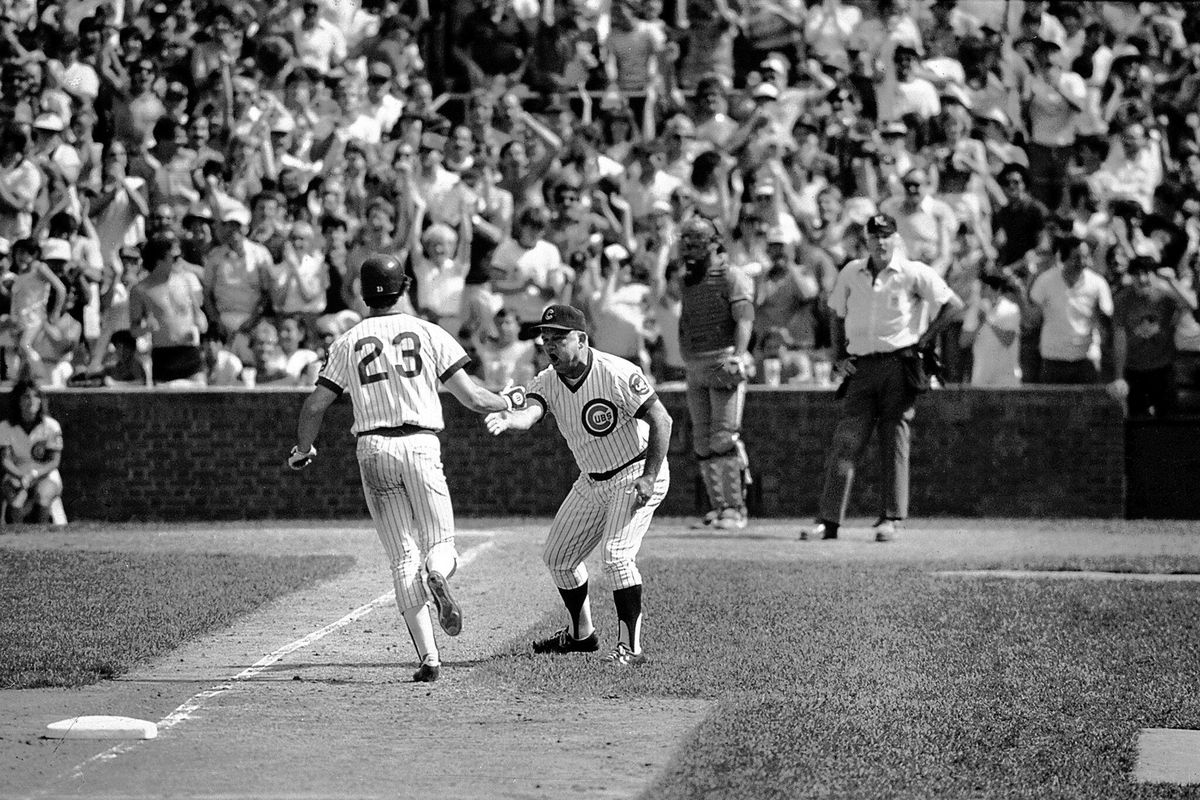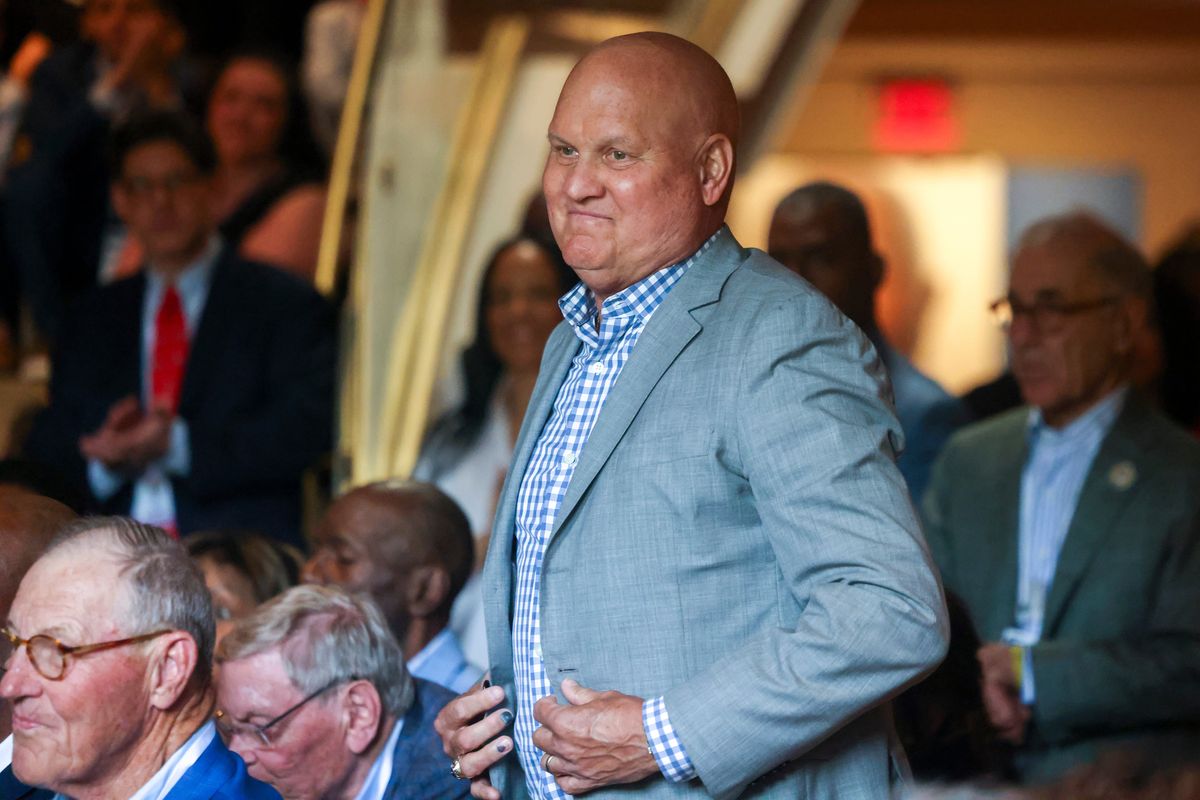‘He did it again!’: It’s been 40 years since epic Cardinals-Cubs ‘Sandberg Game’ unfurled
Chicago Cubs second baseman Ryne Sandberg is congratulated by third-base coach Don Zimmer after hitting a ninth-inning home run against the Cardinals on June 23, 1984. (Tribune News Service)
Quite succinctly, it’s simply known as “The Sandberg Game.”
It was close to instead being remembered as “The McGee Game.”
But 40 years later as of Sunday, it still is recalled as one of the wildest games – maybe the wildest one – in the esteemed history of the Cardinals-Cubs rivalry, a back-and-forth heavyweight bout the Cubs won 12-11 in 11 innings. It was a contest so rollicking and riveting that hall of fame baseball announcer Bob Costas, who broadcast it nationally on NBC’s “Game of the Week” alongside analyst Tony Kubek, still marvels at the drama.
“It’s the best regular-season game I’ve ever called,” he recently said. “For sure.”
It was a sun-splashed Saturday afternoon at Wrigley Field, and the Cardinals surged to a 7-1 lead after two innings and 9-3 in the middle of the sixth. But the Cubs stormed back and trailed just 9-8 when batting in the bottom of the ninth. What unfolded was an epic battle between future hall of famers, Chicago second baseman Ryne Sandberg and Cardinals closer extraordinaire Bruce Sutter. Sandberg had done little against Sutter previously in his career.
“He just had pitches that would just eat me up on the inside part of the plate,” Sandberg said in a splendid documentary about the game that includes interviews from many of the participants. “… But I had a little different swing going on and a different mentality. … I do remember aiming under the baseball for the first time in my career, and boom!”
“Boom” was right. He blasted a 1-1 pitch into the left-field bleachers to lead off the half inning, igniting a wild uproar at Wrigley.
But Sutter settled down to get out of the inning without any more damage and back roared the Cardinals in the classic contest, scoring twice in the top of the 10th – with outfielder Willie McGee not only doubling in a run for his sixth RBI of the day but in the process also hitting for the cycle. Then he scored what seemed to be an insurance run, making the Cards’ lead 11-9.
Costas captured the drama: “If you’re a fan of whatever team winds up losing this game – it might be difficult to accept this point of view – but if you’re just a fan of the game itself and no particular rooting interest for either club, you leave a ballpark like Wrigley Field after a game like this glowing. This has just been a great ballgame.”
But the glow then was just a flicker compared with what was to follow.
In the bottom of the 10th, Sandberg came to the plate with a runner on base and two out. He again was facing Sutter.
Harry Caray, former longtime Cardinals broadcaster, left no doubt about what happened in his call on Cubs radio:
“He did it again! He did it again! The game is tied! The game is tied! Holy cow!”
So Sandberg – a three-sport star from Spokane’s North Central High School – not only twice had hit game-tying homers in what could have been the game’s final inning, but both came off the sport’s top reliever at the time.
“With Bruce Sutter on the mound, that’s what made it even tougher,” McGee recently told Post-Dispatch sports columnist Benjamin Hochman. “I mean, that was amazing what Sandberg did.”
Sutter once said of Sandberg’s heroics against him that day, “You’re going to throw the pitch that either wins the game or loses the game that night, and you just live with that.”
But neither homer decided the game. After the Cardinals failed to score in the top of the 11th, the Cubs mustered a run in the bottom of the inning – even though Sandberg was not involved – for an epic 12-11 victory, leaving Cardinals manager Whitey Herzog to call Sandberg “another Baby Ruth.”
‘The Natural’
Sandberg, who was named to Parade Magazine’s high school All-America football team, signed a letter of intent to play quarterback for Washington State before opting to sign with the Philadelphia Phillies after being selected in the 20th round of the 1978 MLB draft. He made his MLB debut with the Phillies in 1981 before being traded to the Cubs prior to the 1982 season.
That 1984 afternoon in Chicago, he finished 5 for 6 with seven RBIs, and Costas compared him to the main character in an epic baseball film that had been released the previous month.
“Roy Hobbs, ‘The Natural,’ would be pleased by Sandberg’s performance today,” Costas said on the telecast. “… They don’t come any more heroic than that. Man, what a day.”
It was just the third big-league season for Sandberg and not only served as the launching pad for his hall of fame career but ignited a 60-34 stretch for the Cubs that vaulted them into postseason play for the first time since 1945.
“I remember it like it was just yesterday,” Sandberg told reporters at the 35th anniversary of the game.
He was the National League MVP that year, led the league in triples (19) and runs (114), hit .314 and won the Gold Glove at second base. He suddenly was a star after that June 1984 game.
“Fans started showing up on the road to meet the bus, media picked up,” Sandberg has said. “It continued to grow and grow and just Cub fans coming out of the woodwork”
McGee, meanwhile, was overshadowed by Sandberg on one of his most productive days personally in baseball.
“You know, he deserved that game’s MVP,” McGee told Hochman. “But the competition – it was a fight, it was a dogfight. But a good, clean Cardinal-Cub baseball game.”
He also called it “one of the greatest games I’ve ever been involved in, all around. I mean, both teams competitive all day, wasn’t over until the (very) end, just a fun game to play in.”
The TV impact
The gem occurred while NBC’s “Game of the Week” was a major force in television sports programming, beaming across the country Saturday afternoons. Cable TV still was in its growth period. Streaming, the internet and most instant communication devices other than land telephone lines were far in the future, so the Saturday over-the-air telecast was the one game in an entire week that many fans outside big league markets would receive.
They would make it a point to tune in to “Game,” which generally had one contest that went to the bulk of the nation and a backup contest that went to the rest of the country. The secondary one primarily was insurance for NBC in case the main game was rained out.
And NBC cashed its policy on June 23, 1984, as rain washed out the other contest. There have been even wilder regular-season games in baseball history but given the context of that era, maybe never a more celebrated one Costas said.
“The difference (for others) is they’re not the ‘Game of the Week,’ they’re not at Wrigley Field, and it’s not traditional foes like the Cardinals and the Cubs,” he said. “It’s the setting and it’s the circumstances. The ‘Game of the Week’ got higher ratings than some playoff games get now.”
The contest lasted nearly four hours, an eternity at that time even with the 11 innings. That caused big problems for NBC, which afterward was set to show a boxing match from Panama. The baseball crew began receiving the hurry-up treatment from network brass.
So after McGee doubled in the lead run in the top of the 10th and then scored to give the Cardinals a two-run lead, early in the bottom half of the inning NBC named him the player of the game (a sponsored recognition) although Costas couched the proclamation by saying, “unless something should change drastically.”
Did it ever. With one out and nobody on in the bottom of the 10th with the home team down by two runs, Costas recognized advertisers Ford, Miller High Life, IBM and AC Delco. Sutter retired the next hitter before walking Bob Dernier on a borderline 3-2 pitch, bringing Sandberg back to the plate.
After the count reached 1-1 and the game likely about to end, NBC really was in a rush and Costas was told to read the production credits.
“They are literally holding the fighters in the locker room and holding off the opening bell until we can throw it to them,” Costas recalls. “They made me jam in the credits.”
Without missing a beat, Costas shifts back to play-by-play in a split second. And what a transition it was:
“One-one pitch. He hits it to deep left-center. Look out! Do you believe it? It’s gone!”
Although that did not end the fabled marathon, it sprouted a star player.
Sandberg said he “just floated right into home plate. And I do remember going into the dugout with probably the biggest smile on my face … to that point on a major-league field, as if (to say): ‘You know what? I belong here.’ “
The game ended on a bases-loaded single by Dave Owen, a journeyman infielder who played in a grand total of 94 games over four big-league seasons in which he hit .194.
“And at least they had the presence of mind to not go immediately to the fight and let us talk a minute about the game,” Costas said.
It had to be savored.
“I never saw a game like this in my life, and I’ve been around a long life,” Caray, who was in his 40th season of calling big-league games, said at the end of his Chicago radio call of the contest. “Holy cow!”

